B-EPICC Workshop "Strengthening Resilience against Climate Change“ in India, 9th & 10th of February 2023
The B-EPICC workshop "Strengthening Resilience Against climate change" took place at the India Habitat Centre in New Delhi, India. The workshop was a joined effort by the Potsdam Institute for Climate Impact Research and its Indian project partner The Energy and Resources Institute (TERI), which hosted the workshop.
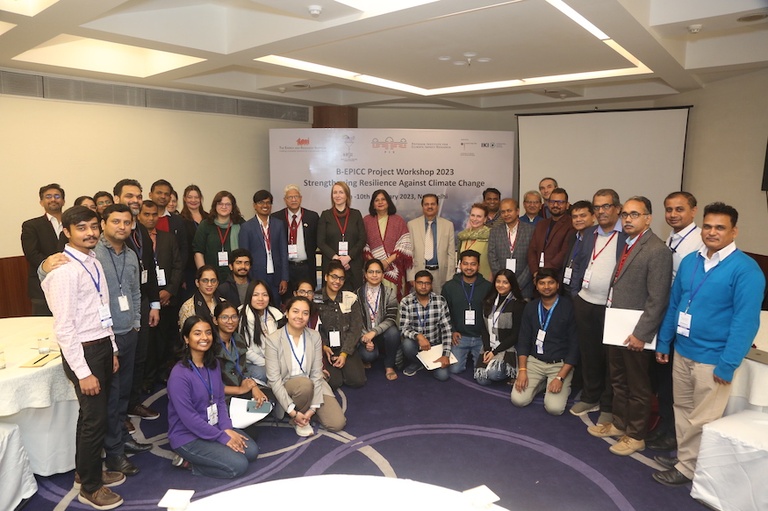 All Participants of the B-EPICC Workshop "Strengthening Resilience against Climate Change“ at the India Habitat Centre in New Delhi, India.
All Participants of the B-EPICC Workshop "Strengthening Resilience against Climate Change“ at the India Habitat Centre in New Delhi, India.
The event focused on showcasing longstanding work in monsoon and extreme weather event forecasting, agriculture modelling and human migration. With respect to the monsoon, project researcher Professor Elena Survovyatkina presented her important work on improving monsoon forecasting timeliness and reliability for parts of India. This was presented in the context of work with local collaborators on early warning around extreme weather. Project researchers Dr Stephanie Gleixner and Dr Roopam Shukla presented work on real-time yield information for crop insurance, as well the social factors that impact upon agricultural production in a changing climate. Project collaborators further extended on this by presenting their work on modelling and mapping agricultural risks in a changing climate, as well as how to build capacity - including amongst affected farmers - in this context. Project researcher Himani Upadhyay presented her work on mobility and immobility pressures arising with climate change in the Indian state of Uttarakhand. With TERI researcher Santosh Muriki, she also showcased a major report prepared within the B-EPICC project in collaboration with TERI, which links modelling of climatic change in Uttarakhand with human mobility. The event was wrapped up with an important discussion hightlighting the challenges and opportunities in communicating climate science in a way that is impactful. Project staff Dr Thomas Nocke and Mechthild Becker highlighted how the B-EPICC project has sought to build climate capacities, including through accessible climate visualisation via the Climate Impacts Online tool. This was rounded off with a presentation by Climate Trends' Aarti Khosla, who focused on communicating climate science in the media.
B-EPICC's Study Tour through India, January-February 2023
Prof. Elena Surovyatkina from the B-EPICC project went on a field trip through India to share her recent discoveries on monsoon forecasting with Indian meteorologists and authorities.
Elena developed a new methodology for forecasting the onset and withdrawal of monsoon for Central India. In 2020, she extended the forecasting to Telangana and Delhi regions, where monsoon has never been forecasted. You can find her forecasts with subsequent analysis on Elena Surovyatkina's Monsoon Page.
This year, she was invited to deliver lectures for the leading organizations in India involved in monsoon research and forecast. On 17th January 2023, the Indian Meteorological Society (IMS), in collaboration with the Indian Meteorological Department (IMD) Pune and the Indian Institute of Tropical Meteorology, organized an event where Elena spoke about "Two types of critical transitions to monsoon: universal definition of local monsoon onset ". You can find the lecture here.
Another highlight involved that Dr. K. Rupa Kumar, the Honorary Scientist President of IMS in Pune, presented Prof. Elena Surovyatkina with a Sign of Honor. Furthermore, a couple of days later, she had the chance to give a lecture to the students at the Saveetha Institute of Medical and Technical Sciences in Chennai.
As another part of her trip, researcher Elena Surovyatkina engaged with various meteorological groups and discussed about the monsoon forecast with experts from the Indian Meteorological Department (IMD). This took place at the historical IMD Library in Pune, established in 1875. Among others, she was honored to meet Dr. O. P. Sreejith, serving as the Managing Director of IMD and Head of the Climate Monitoring and Prediction Group, as well as meteorologist Sikandar M Jamadar.
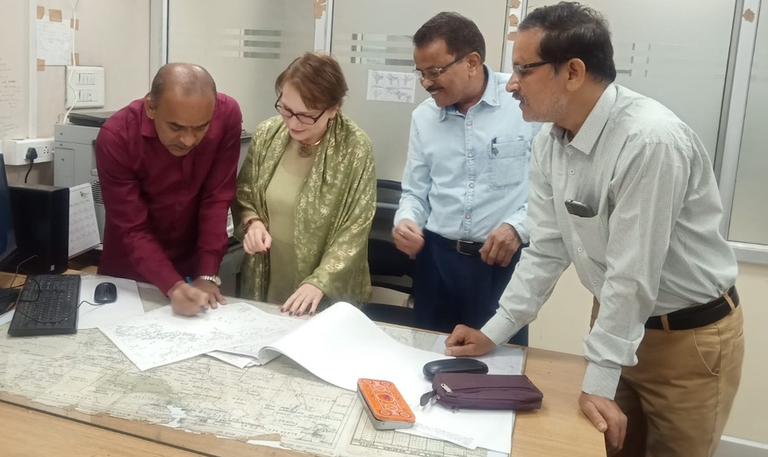
Prof. Elena Surovyatkina engages with various meteorological groups at IMD Pune. ©Surovyatkina
On top of that, Prof. Elena Surovyatkina was invited to work in collaboration with the "Fluid Dynamic Laboratory" at the Indian Institute of Tropical Meteorology.
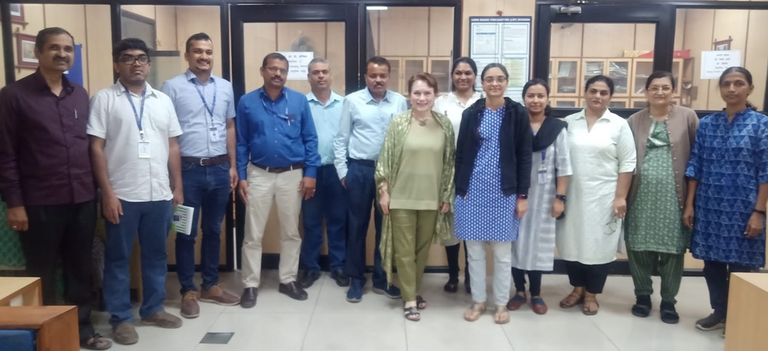
Group Picture at Indian Institute of Tropical Meteorology. ©Surovyatkina
On the 8th February 2023, The National Centre for Medium Range Weather Forecasting (NCMRWF) and IMS organized a talk by Prof. Surovyatkina. She was warmly welcomed by Dr. V S Prasad, the Head of NCMRWF and held a lecture about the "Universal definition of local monsoon onset". All members of IMS and the Noida Chapter attended the event. Some days later, on the 17th February 2023, the IMS and IMD organized another lecture by Prof. Elena Surovyatkina which you are able to watch here. Last but not least, she shared her knowledge and research experience during her visit to the Saveetha Institute of Medical and Technical Sciences in Chennai, Tamil Nadu.
We kindly thank everyone who made this field trip possible for collaborating and sharing knowledge!
B-EPICC's Study Tour to IIT Roorkee, India, 15th-28th of September 2022
B-EPICC's agricultural expert Dr Stephanie Gleixner visited project partners and collaborators in India
In September 2022, B-EPICC agricultural researcher Dr Stephanie Gleixner travelled to India and met with researchers from TERI and IIT Roorkee. B-EPICC's project partners at TERI in Delhi organized a discussion of possible research trajectories in the project’s agricultural work with experts on sustainable development in Indian agriculture. At IIT Roorkee, Dr Gleixner was hosted by Prof Roopam Shukla at the Centre of Excellence in Disaster Mitigation and Management. The 12-day stay gave the opportunity to meet with numerous scientists and students of IIT Roorkee. In collaboration with the Co-PREPARE project (Collaborative Indo-German Project on Estimating and Predicting Natural Hazards in the Himalayan Region), B-EPICC and IIT researchers work together on mapping the risks and vulnerability of small-holder farmers in India to climate change and extremes. As IIT Roorkee is foremost a teaching institution, particular focus is put on the inclusion of students into the research.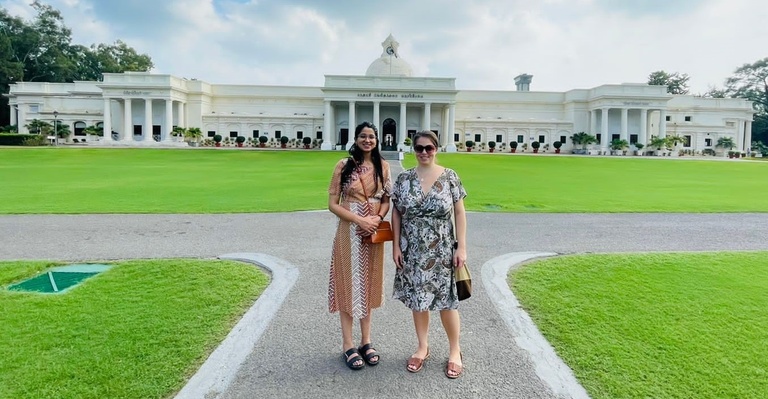
Climate Migration Risk Report India, Uttarakhand, 25th of March, 2021
The report “Locked Houses, Fallow Lands: Climate Change and Migration in Uttarakhand, India”, jointly elaborated by the researchers from the Potsdam Institute for Climate Impact Research (PIK) and The Energy and Resources Institute (Teri), focuses on the Indian state of Uttarakhand. It is one of the first assessments done on climate change and migration at the sub-national level in India. The report provides an integrated assessment, employing the latest climate data to arrive at granular environmental risks and the impacts thereof on migration conditions. It particularly explores the role of agriculture to better understand climate-migration linkages. The report presents a hotspot map outlining projected climate change effects, projected climate extremes, impacts on agriculture, migration indicators and population density.
The report is based on a review of the state-of-the-art literature and draws from a variety of sources, including scientific publications, government reports, policy documents, working papers, and statistical data. The report is divided in 7 chapters. Chapter 1 introduces the report and its key focus. Chapter 2 gives an overview of Uttarakhand which describes trends in its economy, population (and depopulation), poverty, regional inequalities, and human development index since the state’s formation in 2000. Chapter 3 focuses on climate change variability and vulnerability in Uttarakhand – including rainfall and temperature trends and projections, extreme weather events, and a discussion of district-wise vulnerability. An analysis of migration follows in chapter 4, including historical trends, current patterns, reasons for migration, migrant destinations, permanent and non-permanent movements, uninhabited villages, and depopulation. After considering the evidence on climate change trends and migration patterns, chapter 5 analyses the linkages between climate change and migration with a focus on agriculture. Chapter 6 discusses existing policy frameworks in the context of migration. Lastly, in chapter 7, gaps in research, data needs, and priorities are outlined as policy recommendations.
The report is a successful example of applying scientific research into policy, where the findings of the risk report are being integrated into the revision of the Uttarakhand State Action Plan on Climate Change (to be completed by 30.06.2021).
The report is available in English. The full study can be downloaded on the EPICC project website at TERI.
Please find the suggested citation format on EPICC Publications page.
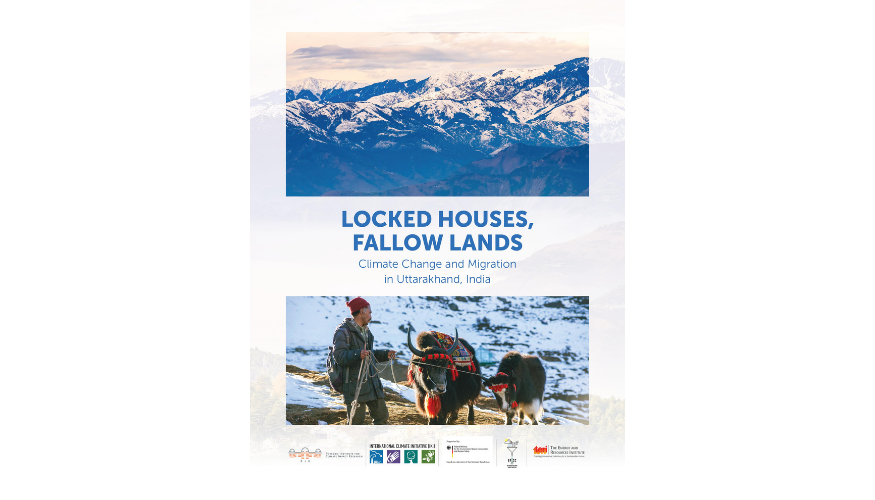
Launch of the report on the 25th of March, 2021
The launch of the report “Locked Houses, Fallow Lands: Climate Change and Migration in Uttarakhand, India” took place on the 25th of March, 2021, and attracted more than 50 participants.
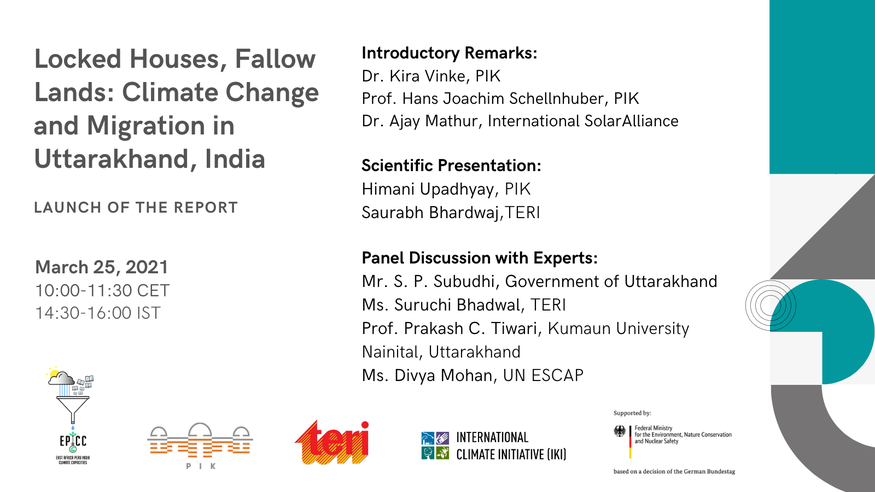
Further links:
- 25.03.21 - PIK News: "Locked Houses, Fallow Lands: Climate change and migration in the Himalayan state of Uttarakhand, India"
- 25.03.21 - TERI News: "Hill districts of Uttarakhand facing greater warming; will accelerate forced migration of local communities"
- 25.03.21 - TERI Twitter thread on the findings of the report [...]
- 26.03.21 - Hindi News: "Teri Reports Revealed Uttarakhand May Be Forced To Face Many Chamoli Like Disasters Due To Rising Temperatures In The Himalayan Region" (Article in Hindi)
- 26.03.21 - TV9 Hindi: "Climate change is becoming a major reason for migration in Uttarakhand, report warns that 2 degree temperature may increase in 20 years" (Article in Hindi)
- 27.03.21 - Newsdesk Uttranews: "Climate change - increasing temperature in mountainous regions of Uttarakhand, danger of migration increasing, study concluded" (Article in Hindi)
- 02.04.21 - Climatepost: "Increasing temperatures in mountainous regions of Uttarakhand, local residents forced to flee" (Article in Hindi)
- 14.04.21 - GaonConnection: "Rising temperature detrimental to India’s manufacturing output: Study"
EPICC & TERI Joint Webinar "Climate Change, Adaptation and Migration" Held as a Part of the Adaptation Futures Webinar Series, 10.12.2020
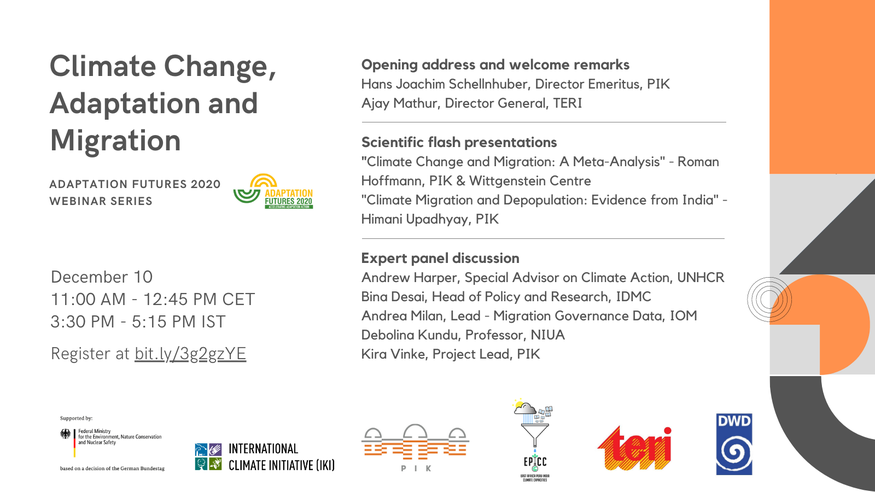
The impacts of climate change are increasingly felt worldwide. Threats come in form of more intense heatwaves and droughts, rising sea levels, and extreme weather events. Such impacts particularly affect lower-income countries, where populations depend heavily on their natural environment and have only low resources to adapt to and cope with changing climatic conditions. Some areas that currently provide livelihoods to subsistence farmers, fishers, or urban dwellers could become uninhabitable in the future. Under these circumstances, migration from affected areas can be the only feasible strategy for affected households to ensure survival. The webinar "Climate Change, Adaptation and Migration", jointly organized by EPICC and TERI, explored the linkages between climate change, adaptation and migration bringing together policy makers, practitioners, and scientific experts. Building on recent evidence and case studies, speakers and panelist discussed the implications of climate change and highlight adaptation challenges and the role of climate-induced migration for affected communities. The webinar was held as a part of Adaptation Futures Webinar Series. Full recording of the webinar is available online, please access here.
Webinar on the Monsoon Prediction in Central India and Telangana - Research that helps farmers to plan for their agricultural cycle during the monsoon season, 13.05.2020
Prof. Elena Surovyatkina delivered a lecture on the monsoon prediction for Central India and Telangana for 2020 during a webinar that was attended by a total of 450 participants from Agriculture, Rural Development, and Related Agencies from India.
The online event was organized by the Professor Jayashankar Telangana State Agricultural University (PJTSAU) in Hyderabad, India, and was presided over by Vice-Chancellor V. Praveen Rao. Legislator Chennamaneni Ramesh, a Humboldt-expert in Agriculture. The chairman of the Indo-German Project on Sustainability introduced the speaker.
Prof. Surovyatkina announced that the onset of monsoon in Telangana is to occur between 16th and 24th of June. Furthermore, she predicted isolated rainfall and dry spells between the last week of June to mid of July and continuous spells of rain subsequently. This information is delivered one month before the start of the monsoon, and is crucial for the agricultural community in India.
The long-term forecast of the monsoon onset, delivered specially for the drought-prone regions in Central India, supports farmers in planning for the agricultural cycle: i.e. to prepare their fields in time for crop sowing or to buy appropriate seed varieties in time. Unexpected early or late monsoon onset results in farmers losing their investment. Using the monsoon onset forecast, the Farmers Advisory Panel of the Agricultural State University advice local farmers and stakeholders on the selection of crop varieties, the timing of the preparation of their fields and timing of crop sowing.
Further information on the monsoon forecast can be found on the PIK Monsoon Page.
EPICC Round Table at the State Climate Change Center (SCCC) titled "Climate Changes Issues & Migration Linkages" in Dehradun, Uttarakhand, India, 19.09.2019
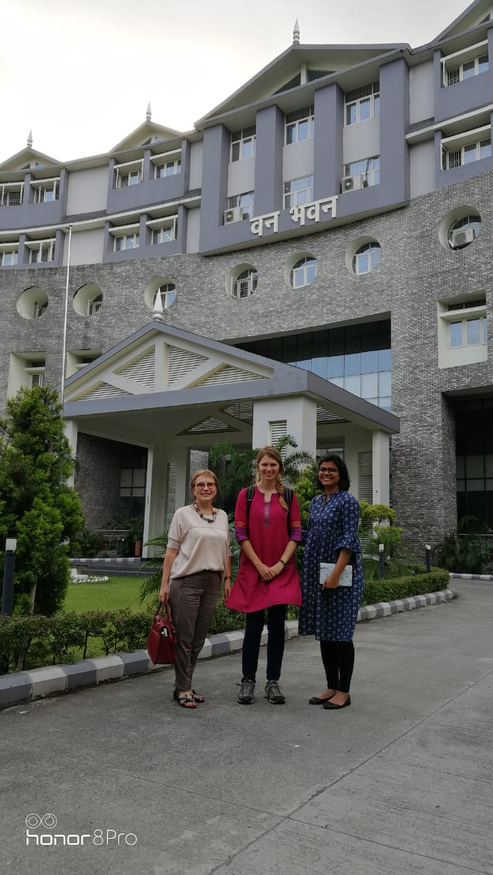
Prof. Dr. Elena Surovyatkina, Dr. Kira Vinke, Mr. Thiago Garcia, and Ms. Himani Uapdhyay visited the State Climate Change Centre (SCCC) on the 19th of September 2019, in Dehradun, Uttarakhand. The primary purpose was to explore climate change issues in Mountainous regions and migration linkages. Mr. R. N. Jha, Nodal Officer of SCCC, hosted the event.
Lessons learned: Uttarakhand is most vulnerable to climate-mediated risks. Mountainous regions are particularly susceptible to climate change and have shown “above average warming” in the 20th century. It may have a significant impact on the natural resources of the region, which not only provide life-supporting, provisioning, regulating, and cultural ecosystem services to the locals, but millions of Indians living downstream. Climate change escalates the already existing vulnerabilities (social, ecological, economic and cultural) and inequities of Uttarakhand and could manifest disastrously if not addressed adequately.
Mr. R. N. Jha explained that the challenge for the state is to holistically converge these existing initiatives and make additional efforts to integrate climate concerns and response measures into all aspects of the development process, from policy and planning to implementation. The state has adopted this as the underlying principle in the formulation of the Uttarakhand Action Plan for Climate Change (UAPCC) and aims to become a green and carbon-neutral state by 2020.
Exchange and discussion:
A key question of the discussion was why a State which was formed for the mountain people (in the year 2000), has in just two decades recorded high levels of out-migration and de-population from the mountain districts? Why are mountain people out-migrating from the mountains? A common consensus amongst the experts was a continued feedback loop between agriculture, climate change, livelihoods, and migration. Mr. R.N. Jha from SCCC said that “migration is a fight for resources in the state, there are urban centers which have resources and then there are peripheries which don’t have the same resources”. Another aspect that was discussed was that the majority of the population in the State depends on agriculture which has become increasingly volatile due to increased uncertainty and decreased productivity. These have been attributed to cumulative impacts of climate change like erratic rainfall, reduction in winter snow, advancing cropping seasons, drying up of perennial streams; coupled with poor infrastructure, lack of employment, rising animal depredation, high literacy rates, and rising aspirations which have pushed the mountain communities into permanent migration. However, Mr. Jha also noted that “research has not been done on climate change and migration links, for instance, it would be useful to know, how does migration from Uttarakhand compare to other parts of India?”
EPICC Round Table at the Indian Meteorological Department (IMD) titled "Cloud Bursts in Monsoon 2019" in Dehradun, Uttarakhand, India, 18.09.2019
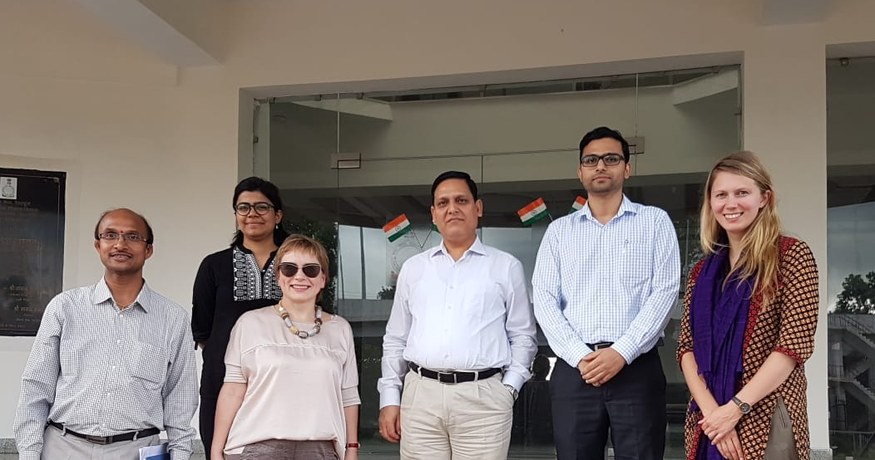
By an invitation of Mr. SH Bikram Singh, Director of the India Meteorological Department (IMD) in Dehradun, Prof. Dr. Elena Surovyatkina, Dr. Kira Vinke, Mr. Thiago Garcia, and Ms. Himani Uapdhyay visited the IMD office on the 18th of September 2019. Dr. Thallada Bhaskar from the Council of Scientific and Industrial Research (CSIR) - Indian Institute of Petroleum initiated this event. The extreme weather during Monsoon season 2019 and monsoon forecasting were the main points of discussion.
Lessons learned: Summer monsoon contributes the most to annual rainfall with amounting to approximately 80% for Uttarakhand. During the monsoon season, many Himalayan states started witnessing exceptional extreme rainfall events known as Cloud Bursts - a showers greater than 100 mm in an hour. Such incidents caused large scale destruction in ecologically sensitive and remotely located vulnerable hilly areas. The most extreme case was in 2013 that led to thousands of deaths was due to cloudbursts. During 1970-2016, 30 cloud burst events have occurred over the southern rim of the Himalayas. In the summer monsoon season 2019 in Uttarakhand, there were at least 23 cloud burst incidents that are an unprecedented number. All rivers, creeks, and drains swelled dangerously following heavy rainfall. Many houses collapsed due to landslides. Cars and buildings, including schools and markets of the areas, have been washed away. Dozen people died, and many injured in landslides, flash floods. The drinking water pipeline, irrigation canals, and fields were affected by the debris.
Exchange of Views: With an increasing number of extreme weather events, the issue of forecasting becomes more and more pressing. "Rainfall has not declined, but rainy days have declined implies that the intensity of precipitation has increased," explained Bikram Singh. The IMD is the process of installing two Doppler radars for monitoring Cloud Bursts, which could help meteorologists to provide operational alert and decreases the damage.
However, there is no methodology to predict such events in advance. "The extensive elevation range, varying from 175 to 7000 m in Uttarakhand, results in intricate rainfall patterns within the state. Cloudbursts occur only via the orographic lift in high elevation region or occasionally when a warm air parcel mixes with cooler air, resulting in sudden condensation.
Additionally, we have found that there is a low density of meteorological stations in the western Himalayan region. Altogether, it adds to the difficulty in cloud bursts prediction," said Prof. Surovyatkina. "However, our long-term forecast for Central India could help for disaster management to estimate the time of arrival of monsoon to Uttarakhand because it is around a week later after Monsoon onset in the Eastern Ghats. We are collaborating with the IMD; together, we are working for improving the monsoon forecast in Uttarakhand."
Project Partner Exchange with TERI, June 2019
In June 2019, Saurabh Bhardwaj from EPICC’s project partner The Energy and Resources Institute (TERI) in India visited the Potsdam Insitute for Climate Impact Research (PIK) to exchange information on the current status of the project implementation and plans with the EPICC team. In the course of the EPICC Monthly Meeting, a monthly exchange between EPICC and PIK researchers, he gave a presentation about "Modelling Regional Extremes For Better Preparedness". Saurabh Bhardwaj presented TERI's state of research and explained the need for regional modelling. He also gave insights into his own research within EPICC and gave an outlook on the next steps. Dr. Lydia Gates from EPICC’s German project partner Deutscher Wetterdienst (DWD) also took part in the EPICC Monthly Meeting. Afterwards, Saurabh Bhardwaj met with Dr. Lydia Gates to discuss the future collaboration and common areas of overlap.
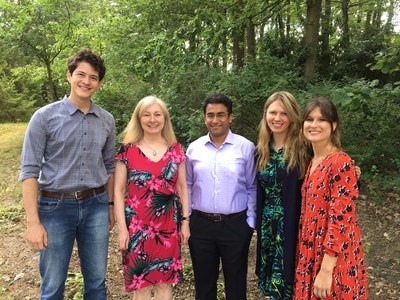
EPICC Workshop in India - 16th and 17th of September 2019
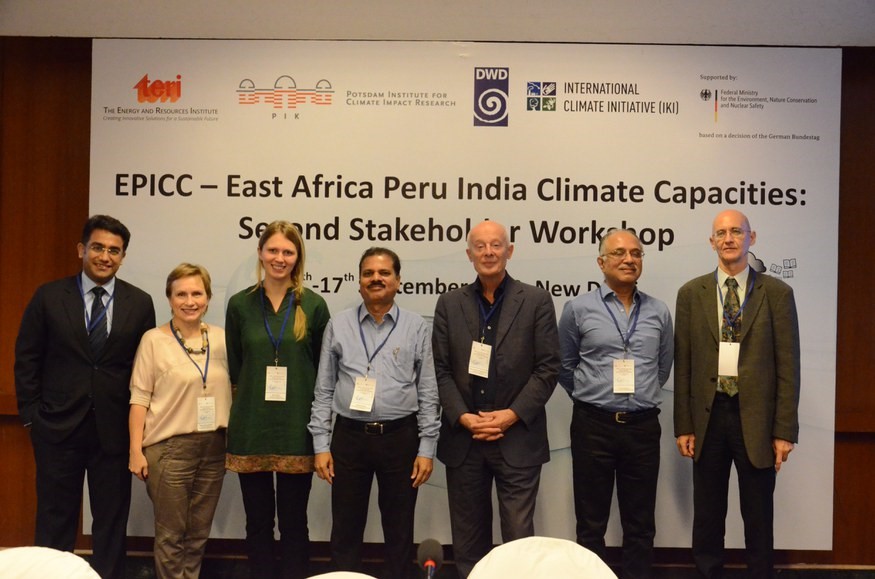
On September 2019, the Potsdam Institute for Climate Impact Research (PIK) and The Energy and Resources Institute (TERI) held the Second Stakeholder Workshop of the East Africa Peru India Climate Capacities (EPICC) project at the Habitat Centre in New Delhi. The two-day workshop counted with the presence of many high level policy-makers, including Dr. Mrutyunjay Mohapatra, Director General of the India Meteorological Department (IMD), Prof. Ramaswamy, former president of the Indian Academy of Science (IAS), Dr. Jörg Polster, Minister and Head of the Economic Department of the Embassy of Federal Republic of Germany in New Delhi, Prof. Hans Joachim Schellnhuber, Founder and Director Emeritus of PIK and many others. The objective of the workshop was to present and to discuss the intermediary products across the different outputs in order to adequate the knowledge that is being produced in the project with the needs of the policy implementers in India.
The project is achieving great success in its objective to help creating capacity and reducing the risk that the partner countries are exposed in a scenario of increasing climate impacts. In the case of India, we want to highlight the cutting-edge research that is being conducted by Prof. Elena Surovyatkina on the prediction of the Monsoon with an impressive antecedence of 40 days for the onset date, and 70 days for the withdrawal date.
EPICC is helping the partner-countries to build climate capacities by promoting relevant research and by connecting top-scientist in the topics of Climate, Agriculture, Hydrology and Migration with policy makers and implementers. The workshop attracted almost 50 participants.
Find more information on the TERI-Website "Climate projections of today becoming reality of tomorrow; need to be strengthened" and in Indian newspapers (SaurEnergyInternational and NRINEWS24x7).
Kick-Off Workshop in India - 1st and 2nd of November 2018
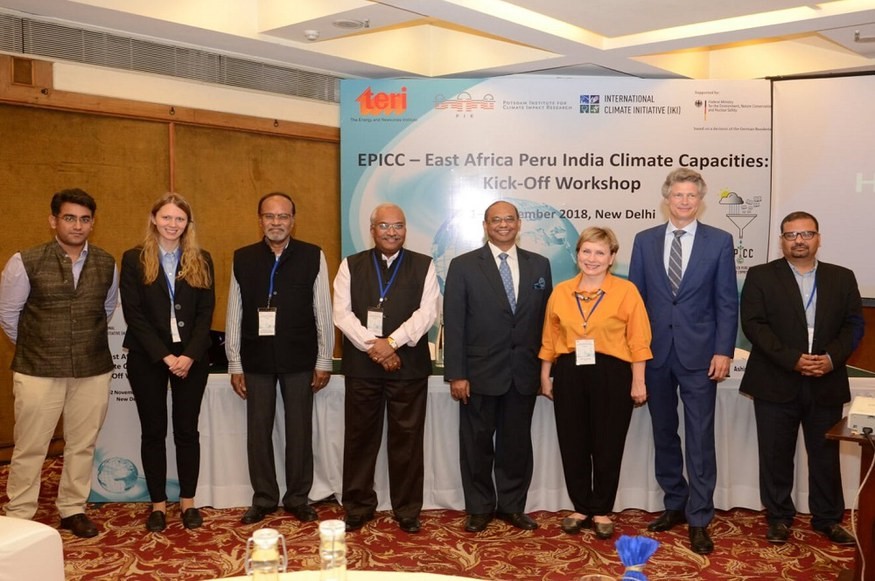
In November 2018, the EPICC Kick-Off Workshop in India took place in New Delhi. Eight scientists from the EPICC Team met with 44 scientists and other stakeholders from India to discuss the project goals, to identify the users need for climate services and to jointly develop relevant research questions.
The event was jointly organized by The Energy and Resources Institute (TERI) and the PIK. Thanks to TERI’s well established network, each thematic session was represented by a key stakeholder that provided the project team with pertinent inputs regarding the regional and national perspectives on their needs for climate services. The Inaugural session of the workshop saw presence of the Deputy Chief of Mission (DCM) of the German Embassy Dr. Jasper Wieck and of the Indian Met Department’s Director General Dr. K. J. Ramesh amongst other senior dignitaries.
It was agreed to focus the cooperation on individual states, such as Uttarakhand (Migration) and Telangana and Andhra Pradesh (Climate and Hydrology). The Hydrology workpackage, e.g., will focus on applying the SWIM model to the Godavari Riven Basin. Early warning of and improved information on extreme events are of great interest as contributions from EPICC. A key entry point for EPICC’s climate services are the State Action Plans on Climate Change (SAPCC). EPICC will further support TERI’s climate portal and the GIZ climate vulnerability portal.
Find the agenda of the Kick-Off Workshop in India with more details here.





